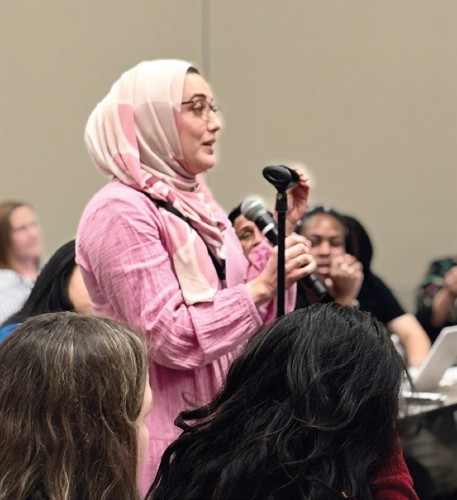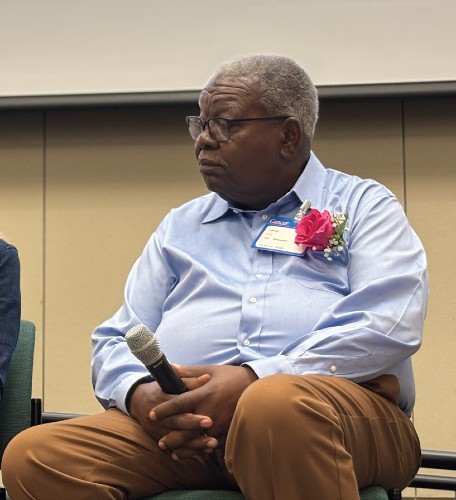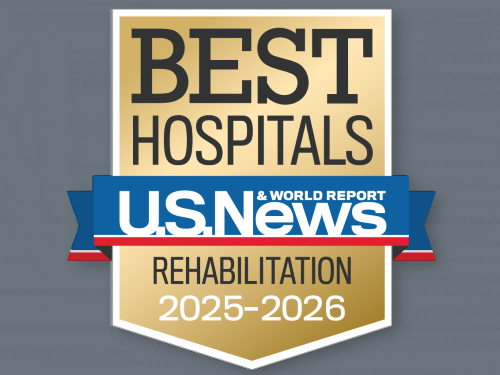 TIRR Memorial Hermann hosts several important conferences and educational events designed to provide clinicians across multiple specialties with the latest patient management approaches in a variety of settings.
TIRR Memorial Hermann hosts several important conferences and educational events designed to provide clinicians across multiple specialties with the latest patient management approaches in a variety of settings.
Over the past 10 years, the TIRR Memorial Hermann Education Academy has worked to increase the number of educational programs presented by the health system, seeing it as being fundamental to its place as a national leader in the field of rehabilitation medicine. The result is a diverse program that brings in speakers and attendees from all over the world.
“TIRR Memorial Hermann has always had a passion for education and strived to be leaders in educating providers,” says Victoria M. Zegarrundo, PT, DPT, the health system’s director of clinical and professional development. “Our goal is really to help all patients across the country and around the world receive the best care possible. This means expanding knowledge of evidence-based practices.”
The Education Academy Upcoming Courses

From March 27 through 30, for example, TIRR Memorial Hermann, along with the Academy of Neurologic Music Therapy®, hosted the International Neurologic Music Therapy® Training Institute. In all, 36 health care professionals from 15 states participated in the program, which included a certification in neurologic music therapy.
“We had music therapists from all over the world really honing their craft, particularly when it comes to caring for the neurologic patient, which is our focus here at TIRR Memorial Hermann,” Zegarrundo notes.
The Neurologic Music Therapy (NMT) System of Techniques® is a standardized, evidence-based clinical treatment system of 20 approaches driven by advances in applied auditory music neuroscience and the clinical understanding of music perception, production and cognition. The NMT system provides structured music-based exercises that can be integrated into intervention practices for all allied health care professionals in disciplines such as physical therapy (PT), occupational therapy (OT), neuropsychology and speech-language pathology (SLP).
In fact, TIRR Memorial Hermann routinely co-treats with NMT clinicians using NMT techniques in patient care for PT (walking and standing exercises), speech therapy (cognition and automatic speech production), and OT music therapy approaches, according to Zegarrundo and Patricia Tully, OTR, OTD, an education resource specialist with TIRR Memorial Hermann.
“Neurologic music therapists work with OT in a wide range of functional skills that include tasks such as walking while reaching and carrying objects as well as other everyday living skills, and they use rhythmic auditory stimulation, entrainment of music, and other techniques to stimulate the neurologic system to help patients relearn how to move,” Tully adds.
In addition, from May 1 through 3, TIRR Memorial Hermann and The University of Texas MD Anderson Cancer Center hosted the 4th Cancer Rehabilitation Symposium (2025): Advancing Patient Centered Care Across the Cancer Continuum. This event is typically held every three years. Perhaps not surprisingly, given the health systems involved in presenting the program, attendees learned about the latest advances in exercise as medicine for cancer patients.
“The focus this year was on treating the cancer patient across the care continuum, from those undergoing prehab—or rehabilitation designed to strengthen the body prior to cancer treatment—to those actively receiving chemotherapy or radiotherapy,” Zegarrundo says.
A key component of the program involved the latest evidence-based approaches for managing some of the ancillary effects of cancer and its treatment, such as physical and emotional complications. A highlight was a panel discussion on body image after cancer, according to Zegarrundo. Attendees included physicians and researchers, nurses, physical therapists, occupational therapists and speech-language pathologists, as well as cancer survivors—or, “as we called them, cancer warriors,” Tully notes—along with members of the local community who care for people with the disease.

Future meetings on the calendar for 2025-2026 include the Second World Stroke Day Research Symposium, which will be held in support of World Stroke Day in October 2025. The inaugural event, held in person and virtually at TIRR Memorial Hermann, focused on the theme “Reimagining Stroke Rehabilitation: Uniting Research, Innovation, and Education for Recovery.” Like last year, this year’s daylong seminar will feature many internationally recognized expert speakers, including several from TIRR Memorial Hermann.
The 2025 event is scheduled to take place on October 10, 2025, in the Memorial Hermann Tower, which can accommodate more than 200 attendees.
“We are going to pull in the best researchers that are doing cutting-edge treatment,” Zegarrundo says.
In December, TIRR Memorial Hermann will also be presenting the Certified Brain Injury Specialist (CBIS) certification preparation course. The twice-yearly program prepares clinicians across specialties for the certification exam by increasing their “understanding the terminology related to patients with brain injury” as well as the latest research in the field, according to Tully. The program draws attendees from a variety of fields, including physical, speech, and occupational therapists, athletic trainers, music therapists, social workers and case managers.
“I’ve been an occupational therapist for 25 years and I would say I learn something new every time I support this course,” Tully notes.
Finally, in January 2026, TIRR Memorial Hermann will present the Spinal Cord Injury (SCI) Symposium. The three-day event, from Jan. 29 through 31, will provide attendees with the latest research in the field, but with a unique twist, according to Tully: The agenda is based on feedback from SCI patients
“The curriculum is really going to be based on what patients with SCI want their providers to know, so topics will range from things like pain management, regaining movement, to patient advocacy and education,” she explains.
Other topics will include sexual health in SCI patients and neuromodulation therapy, Tully adds.
All of these educational events really want to establish a strong foundation for advancing clinical practice across specialties,” she says. “They are designed to be very hands-on and give attendees an idea of the day-to-day concerns involved in managing patients in the rehabilitation medicine setting. The hope is that clinicians from TIRR Memorial Hermann and other institutions will learn about what’s happening in research and then translate that into practice.”

Education

With our teaching and academic affiliation for multiple disciplines, 75% of therapists have advanced certifications and over 50% of nurses are certified in rehabilitation nursing.
See All Courses